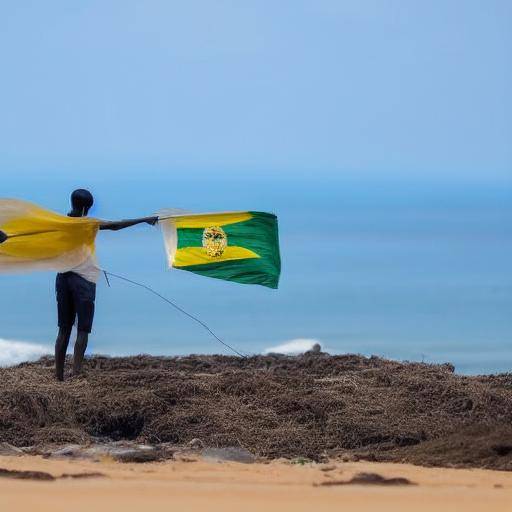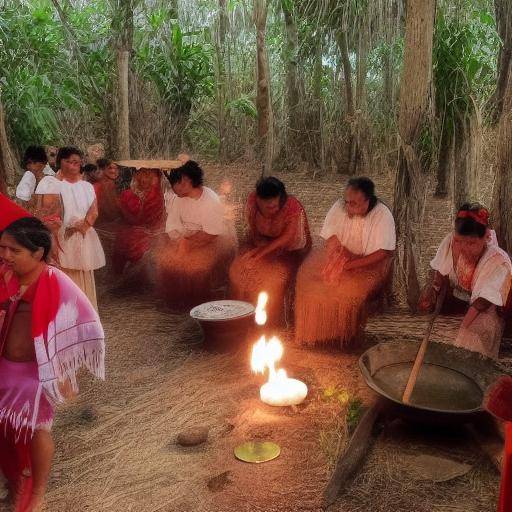
The initiation ritual with the bullet ants is a unique and fascinating practice carried out by the Satere-Mawe tribe in the Amazon region of Brazil. In this article, we will explore in depth the history, the cultural aspects, the pain involved, the resistance of the participants and how this ritual has lasted over time. We will discover the importance of this ceremony in indigenous culture, its potential benefits and challenges, and analyze its impact on the current society. Join us on this journey through the Amazon rainforest and learn about the fascinating world of initiation with bullet ants.
Introduction
The ritual of initiation with bullet ants of the Satere-Mawe tribe is an ancestral practice that has attracted the attention of numerous researchers and curious people around the world. This ceremony is not only a rite of passage for the young people of the tribe, but also represents a symbol of strength, courage and resistance. Throughout this article, we will deepen the history of this ritual, explore the impact of pain and resistance on Satere-Mawe culture, and analyze its relevance in the current context.
History and Background
The Satere-Mawe tribe, whose name is translated as "people of true hearts", resides in the Amazon region of Brazil since time immemorial. The initiation ceremony with the bullet ants, known as "The Dance of the Hormigas", is fundamental in the worldview and traditions of this community. The ritual consists of placing the bullet ants, known for their painful bite, in gloves woven with vegetable fibers. Participants must endure the pain of bites for several minutes as proof of their courage and maturity.
The history of this ritual goes back to generations, and its meaning has evolved over time. In addition to being a rite of passage for young people, the ceremony of the "The Dance of the Hormigas" symbolizes the spiritual connection with the Amazon rainforest, the physical and mental strength, and the transmission of ancestral knowledge from generation to generation.
Analysis in Deep
The impact of the initiation ritual with bullet ants goes beyond the mere resistance to pain. For the Satere-Mawe tribe, this ceremony represents an act of cultural resistance against external influence and a way of preserving its identity and traditions in a changing world. The sacrifice and determination shown by the participants during the ceremony reinforce community ties and encourage respect for ancestral values.
In turn, the ceremony has awakened the interest of researchers and anthropologists, who have studied the physiological and psychological effects of the ritual in the participants. Despite the intense pain experienced, some studies suggest that exposure to the stings of the bullet ants can trigger biochemical responses that promote the release of endorphins, providing a sense of euphoria and well-being once the test is over.
Comprehensive review
The ritual of initiation with bullet ants also raises ethical and moral questions, especially in a contemporary context where the preservation of indigenous traditions faces growing challenges. The discussion on respect for ancestral customs versus the protection of the physical and emotional integrity of individuals is a relevant and current topic. Furthermore, marketing and tourism around this ceremony pose additional challenges for the Satere-Mawe tribe in protecting its cultural heritage.
Despite these controversies, the "La Danza de las Hormigas" remains a practice rooted in the identity of the Satere-Mawe tribe and represents a living example of the resistance and determination that characterize this indigenous community. As the modern world and ancestral traditions come into contact, the comprehensive analysis of these aspects provides a valuable perspective on the coexistence of diverse cultures.
Comparative analysis
By comparing the initiation ritual with bullet ants with other passing rituals or trials of courage in different cultures, interesting similarities and contrasts arise. While some communities value physical resistance as a symbol of maturity and strength, other societies emphasize emotional or spiritual resistance as a fundamental part of their initiation rituals. These parallels and variations offer a broad and enriching view of the different ways in which human cultures face trials and challenges.
Practical Tips and Recommendations
For readers interested in understanding more thoroughly the initiation ceremony with bullet ants, it is essential to approach with respect and sensitivity to the traditions of the Satere-Mawe tribe. In addition, educating yourself on the current culture, history and challenges of indigenous communities in the Amazon region will help to foster a deeper understanding of the importance of preserving these ancestral traditions.
Industry Perspectives and Expert Reviews
The growing recognition of the importance of the preservation of cultural diversity and the protection of the rights of indigenous communities has attracted the attention of leaders, activists and human rights and anthropology experts. Their views provide valuable information on the challenges and opportunities faced by these communities, as well as suggestions to promote constructive dialogue and sustainable support for their cultural conservation efforts.
Case Studies and Practical Applications
The exploration of real cases that illustrate the importance of resistance, adaptability and the transmission of knowledge in indigenous communities allows readers to understand the significant impact these traditions have on everyday life. The concrete examples provide an authentic and tangible view of how these practices, including the initiation of ants, influence the identity and well-being of indigenous communities.
Future Trends and Predictions
As the world faces increasingly pressing challenges in the preservation of biodiversity and respect for indigenous cultures, greater attention and support is envisaged for the conservation of these traditions. Future perspectives suggest that the resurgence of interest in traditional practices, including the initiation ritual with bullet ants, could play a crucial role in promoting cultural diversity and protecting ecosystems in the Amazon region.
Conclusion
The ritual of initiation with bullet ants of the Satere-Mawe tribe is a moving testimony of the resistance, courage and cultural heritage that endures throughout the centuries. Through the detailed exploration of history, the meaning, impact and future prospects of this ceremony, we have acquired a deeper understanding of its relevance in the current context. It is essential to recognize and appreciate the cultural wealth of indigenous communities and to work together to preserve their unique traditions for generations to come.
Frequently asked questions
What does "Satere-Mawe" mean and what is its relevance in indigenous culture?
The term "Satere-Mawe" is translated as "people of true hearts" and represents an indigenous community with a rich history, rooted traditions and a deep connection with the Amazon rainforest.
What is the purpose of the initiation ritual with bullet ants in the Satere-Mawe tribe?
The ritual of initiation with bullet ants is a rite of passage that symbolizes the courage, resistance and maturity of the participants. It also represents a way of transmitting cultural values and strengthening community ties.
How is the initiation ritual performed with bullet ants?
During the ceremony, participants should place gloves with vegetable fibers containing bullet ants, and support the bites of these ants for a given period of time.
What is the importance of pain in the initiation ritual with bullet ants?
The pain experienced during the ritual is considered a symbol of resistance, courage and connection with the Amazon rainforest. For the Satere-Mawe tribe, overcoming this challenge is fundamental to the maturity and personal development of the participants.
What is the opinion of the Satere-Mawe community on the preservation of its cultural traditions?
The Satere-Mawe community deeply appreciates the preservation of its cultural traditions and the transmission of ancestral knowledge to future generations. They see in these ritual practices a way of strengthening their cultural identity and their cohesion as a community.
How has globalization and tourism impacted in the initiation ceremony with bullet ants?
Globalization and tourism have posed challenges to the preservation of the authenticity and cultural significance of the initiation ceremony with bullet ants, generating debates on the protection of the integrity of these traditional practices.
What measures have been taken to protect the traditions of the Satere-Mawe tribe?
The Satere-Mawe tribe has made efforts to raise awareness of the importance of its traditions, to establish agreements with governmental entities and international organizations to protect its cultural heritage, and to establish regulations for its practice in an ethical and respectful context.
In conclusion, the Satere-Mawe tribe's bullet-boiled initiation ceremony provides a profound and fascinating view of resistance, cultural identity and the transmission of ancestral knowledge in the Amazon region. Its meaning transcends the simple threshold of pain to reflect a legacy of courage and resilience that deserves to be valued and preserved in the present world.

